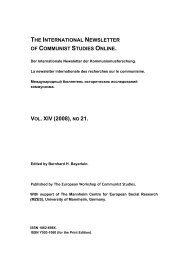11RXNdQ
11RXNdQ
11RXNdQ
Create successful ePaper yourself
Turn your PDF publications into a flip-book with our unique Google optimized e-Paper software.
From one China to another* 7<br />
never stop returning and who never go, the mandarins who take flight, and the generals<br />
who flee. Those who are making History have never seen the great imperial cities; they<br />
only know the mountains and the fields; in the fields and in the mountains, the destiny of<br />
China has been decided. For the first time, a capital awaits the pleasure of the country.<br />
History will appear in the form of a procession of peasants. Townspeople think of the<br />
country as an inert space which links the towns and which is crossed and devastated by<br />
armies until, in the towns, they have decided to make peace. But suddenly it reveals<br />
itself: it is living flesh, muscle; within this muscle, the towns are lodged like grains of<br />
urate.Yet the crowds are not afraid. Up there, the eye of America is spinning round in<br />
panic. But on the ground they have known for a long time that the communists have won.<br />
The rich curse Chiang Kai-shek as much as Mao Tse-tung. The peasants want to go back<br />
home: since everything is in the hands of the communists, they might as well go and meet<br />
them in the villages as in the towns. The workers and the poor begin to hope; the<br />
thousand individual waits of the time of Repetition have come together and fused in a<br />
single hope. The rest of the population march in processions and pray for peace: for any<br />
peace. It is a way of killing time. Before joining the bonzes and burning paper wands,<br />
they make the most of the opportunity to put their personal affairs in order. They go and<br />
rub the nose of an idol, for their own benefit; infertile girls press their stomachs against<br />
the stomachs of statues; after the ceremony, in the large pharmacy near the temple,<br />
people will be buying dried pellets which restore ardour to listless husbands and which<br />
warm the feet of wives.<br />
As long as the authorities remain at their post, the crowd stays under pressure. The<br />
police surround it and contain it; but, unlike ours, they rarely strike: this policeman is<br />
getting impatient because they are hemming him in too tightly. He lifts his leg: is he<br />
going to kick out? No, he stamps in a puddle; having been splashed, the people will step<br />
back. But the gentlemen of the Kuomintang will not stay in place; they go off. There are<br />
a thousand left; a hundred left. Soon there will be none. The gentlemen who cannot leave,<br />
yellow men and white men, are pale with fear. During the period of transition, the base<br />
instincts of the population will be let loose: there will be pillaging, rape and murder. As a<br />
result the bourgeois of Shanghai pray for the communists to come; any kind of order<br />
rather than the fury of the people.<br />
This time it is all over. The important people have left, the last policeman has<br />
disappeared; the bourgeoisie and the populace alone remain in the city. Will there be<br />
pillaging or not? Admirable crowds – when they no longer felt the weight of the burden<br />
that was crushing them, they hesitated for a moment and then, little by little, became<br />
decompressed; great masses return to a gaseous state. Look at the photographs;<br />
everybody has started to run. Where are they going? Pillaging? Not even that; they have<br />
entered the fine, abandoned houses and have scavenged, just as, only yesterday, they<br />
scavenged in the piles of rubbish. What have they taken? Practically nothing: the<br />
floorboards to make a fire. All is calm; let them come now, the peasants from the north:<br />
they will find an orderly city.<br />
Remember June 1940, and those funereal giants who raced across a deserted Paris in<br />
their lorries and their tanks? Now, that was picturesque: not much voluptuousness, but<br />
blood and death, and a lot of pomp. The Germans wanted a ceremonious victory. That is<br />
what they had, and the handsome SS officers, standing on camouflaged vehicles, looked




